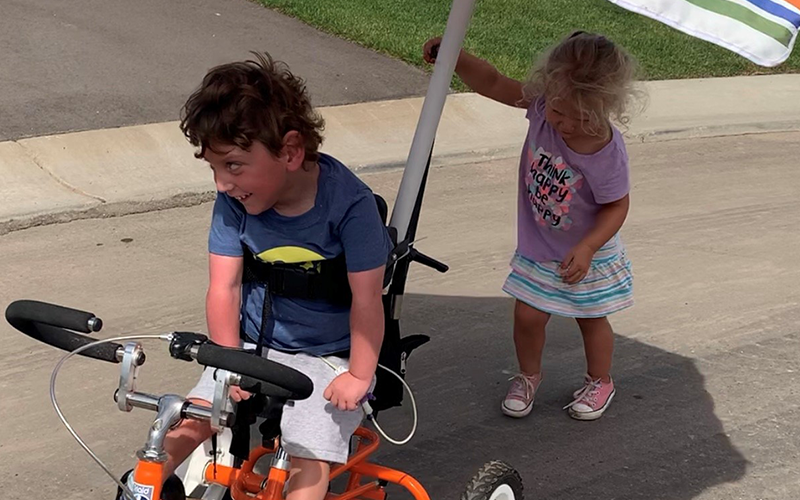Empathy, understanding, compassion and acceptance can be difficult to teach a child.
Reading books and talking only goes so far, it’s modeling that can have the biggest impact. We recently moved into a wonderful neighborhood that is full of kids. The parents in our cul-de-sac have interacted with Sawyer the same as the other kids since they met him. He is just one of the other kids in their eyes and that means so much to us as a family. These special parents have never stared or even flinched when he has a reflux episode, which usually includes lots of vomit. I suspect this is why their children have come to love Sawyer. Their parents have modeled the empathy, love and understanding and in turn their children have modeled their behavior.
About a week ago I put Sawyer on his trike and pushed him with the girls while they rode their bikes around him. He laughed and enjoyed being with all the other kids. One of the younger girls that Sawyer has a special connection with observed me pushing him around. After a few minutes she approached and asked “Can I push Sawyer please? She had so much fun pushing Sawyer and he gleamed with delight. Soon the other girls noticed and asked if they could have a turn. They all had a blast pushing him and Sawyer laughed so hard we had to stop. A projectile vomiting episode could have easily ruined the moment.
The girls often ask me questions about Sawyer, and I am so happy to answer these questions. His little “girl” friend is the boldest with her questions. “Why he have to ride his bike like that?” “Why he has to stand in the wheelchair?” “Why he has a feeding tube?” Each of the girls will listen attentively while I explain and sometimes ask follow up questions.
Sawyer is so lucky to have these friends nearby that he can interact with while we are avoiding public situations.
He will have a core group of friends to look out for him when he attends school, this alone brings tears to my eyes. He will have strong girls who will wave to him in the hallways and act as big sisters on the playground.
These kids will in turn grow up with a child that is different than them. A child that requires patience and understanding, a child they will learn to communicate with differently. They have already asked many questions and continue to ask questions about him every day. I do my best to answer their questions, but I know that his growing connection with them will have a long-lasting effect on them.
As adults we can change how children with special needs are seen. We are raising the next generation and can help change the world for the better by simply modeling empathy, understanding and patience with everyone around us.
